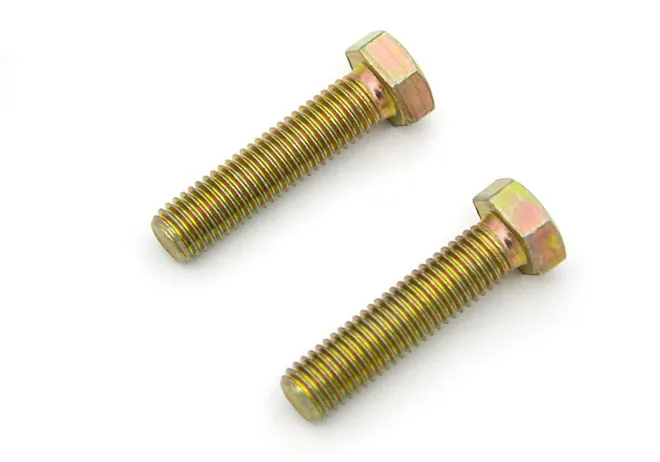china astm a320 gr l7 stud bolt
វិច្ឆិកា . 22, 2024 05:50 Back to list
china astm a320 gr l7 stud bolt
Understanding ASTM A320 Grade L7 Stud Bolts A Comprehensive Overview
In the world of industrial fasteners, the ASTM A320 specification plays a crucial role, particularly when it comes to ensuring the integrity and reliability of connections in harsh environments. Among the various grades specified under this standard, Grade L7 stud bolts stand out due to their specific material properties and performance characteristics. This article delves into the details of ASTM A320 Grade L7 stud bolts, exploring their applications, material composition, manufacturing process, and benefits.
What is ASTM A320?
ASTM A320 is a standard specification developed by ASTM International, which outlines the requirements for bolts, screws, and studs meant for low-temperature service. This specification is particularly critical for applications in environments that may experience temperatures as low as -150°F (-101°C). It encompasses various grades, each having distinct mechanical properties and chemical compositions suited for specific applications.
Specifications of Grade L7
ASTM A320 Grade L7 signifies a high-strength stud bolt made from carbon and alloy steel. The essential characteristics of Grade L7 stud bolts include
- Material Composition Generally, L7 stud bolts are made from low-temperature carbon steel, often alloyed with certain elements like manganese and molybdenum. This combination enhances their strength and impact resistance at lower temperatures.
- Mechanical Properties The mechanical properties of Grade L7 include a minimum yield strength of 118 ksi (kilopounds per square inch) and a minimum tensile strength of 125 ksi. These properties ensure that the stud bolts can endure significant stresses while maintaining their structural integrity.
- Temperature Performance As indicated by the ASTM A320 specification, Grade L7 is designed for low-temperature applications, making it an excellent choice for industries such as oil and gas, power generation, and chemical processing, where environmental conditions can be extreme.
Manufacturing Process
The production of ASTM A320 Grade L7 stud bolts requires precise engineering and quality control. The manufacturing process typically involves
1. Material Selection High-quality steel is chosen based on the desired mechanical properties and the application requirements.
2. Cold Heading The initial shaping of the stud bolts is often done using a cold heading process, which involves forming the material into rough shapes without heating.
3. Threading After shaping, the bolts are threaded to the required specifications, which helps in achieving the necessary grip and ensures compatibility with nuts and other fasteners.
china astm a320 gr l7 stud bolt

4. Heat Treatment To enhance strength and hardness, the stud bolts may undergo heat treatment processes, including quenching and tempering.
Applications of L7 Stud Bolts
Due to their exceptional strength and low-temperature performance, ASTM A320 Grade L7 stud bolts are widely used in various industries
- Oil and Gas In the exploration and production of oil and gas, equipment often operates in low-temperature environments. L7 stud bolts are commonly used in flanges and pressure vessels.
- Power Generation Power plants, especially those using fossil fuels, utilize L7 stud bolts in their structural and piping systems where temperature fluctuations can occur.
- Chemical Processing The chemical industry frequently employs low-temperature fasteners to ensure the integrity of reactors and storage tanks, which may be subject to extreme conditions.
Benefits of Using ASTM A320 Grade L7 Stud Bolts
Utilizing ASTM A320 Grade L7 stud bolts presents several advantages
- Strength and Durability Their high yield and tensile strength make them suitable for critical applications, reducing the likelihood of failure.
- Corrosion Resistance When properly coated or treated, L7 stud bolts also offer resistance to corrosion, further extending their lifespan in harsh environments.
- Versatility These stud bolts can be used in a wide array of applications across different industries, making them a valuable addition to any fastener inventory.
Conclusion
ASTM A320 Grade L7 stud bolts are an essential component in many industrial applications, renowned for their strength, durability, and performance in low-temperature environments. Understanding their specifications, manufacturing processes, and applications helps industries select the right fasteners for their needs, ensuring safety and reliability in their operations. As industries continue to evolve, so too will the need for high-quality fasteners like the Grade L7 stud bolts.
Latest news
-
Reliable Wire Bolts Suppliers | Quality Zinc Plated Fasteners
NewsAug.26,2025
-
Wire Bolts Suppliers: Durable & Reliable Fasteners for Every Project
NewsAug.25,2025
-
Premium Cabinet Bolts Supplier | Wholesale & Custom Solutions
NewsAug.24,2025
-
Reliable Axle Nuts Supplier | Quality & Precision Fasteners
NewsAug.23,2025
-
Durable Bolts for Lawn Mower Handle - Top Supplier & Manufacturer
NewsAug.22,2025
-
High-Quality Bolts for Lawn Mower Handle Supplier & Manufacturer
NewsAug.21,2025
